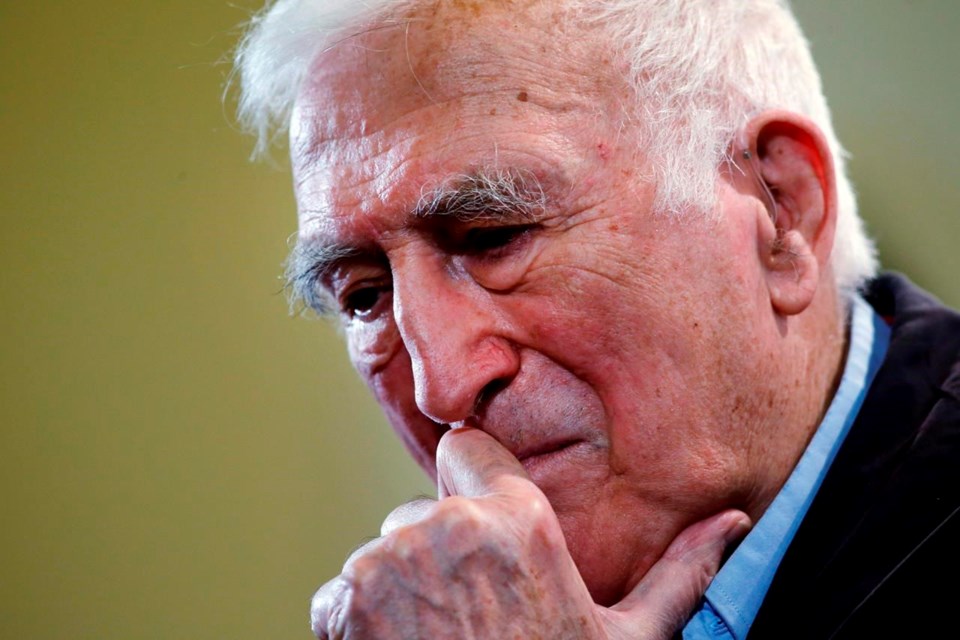MONTREAL — A charitable organization founded by the late Jean Vanier issued a report Monday saying the Canadian sexually abused at least 25 women during his decades with the group.
L'Arche International commissioned the report, which identified 25 women who experienced a sexual act or an intimate gesture involving Vanier between 1952 and 2019.
But according to the independent findings from a commission of independent French scholars, that number could be higher. "The commission assumes that 25 is lower than the actual number of women concerned," the report says.
Vanier, son of former governor general Georges Vanier, worked as a Canadian navy officer and professor in Toronto before founding L'Arche. The non-profit group provides alternative living environments where people with developmental disabilities can be full-fledged participants in the community.
The 868-page report was commissioned by L'Arche to better understand the actions of Vanier and Rev. Thomas Philippe, a Catholic priest whom Vanier had called his "spiritual father." A previous report made public in February 2020 concluded Vanier had manipulative sexual relationships with at least six women in France between 1975 and 1990 and used his power to take advantage of them.
The new report says the relationships between Vanier, who died in 2019, and the women were "part of a continuum of confusion, control and abuse."
It disputes Vanier's account of the origins of L’Arche, saying it was not a “revelation” during a visit to a psychiatric facility that led him to found the charity. Rather, the devotion to help people with disabilities offered a "screen" for Vanier to continue his association with Philippe, who espoused "mystico-sexual" beliefs and had been sanctioned by the Catholic Church previously for abuse.
It found that the hidden sect identified people seeking spiritual guidance and exploited them for sexual purposes. It was mainly based in the French town of Trosly-Breuil, where L'Arche was founded.
"It was within the community of Trosly that the majority of the cases of control and sexual abuse investigated by the commission took place," the report reads. "People accused of sexual abuse have been members and have held positions of responsibility there, victims still live nearby."
There was no evidence that intellectually disabled people had been abused. The alleged abuse was mostly confined to the community in France, but the commission said it received accounts of abuse in other countries, including Canada and India. The women linked to Vanier were all described as young adults, between 20 and 35 years old -- single, married or having taken religious vows.
"Without necessarily declaring themselves all victims, the women who testified underline the confusion between the spiritual, affective and sexual planes, which characterized the relationship," the report reads.
In a statement, L'Arche Canada said it welcomed the report and thanked the women who came forward.
"We stand with them and others who have suffered abuse," the Canadian branch said.
The revelations in February 2020 left the Canadian branch and numerous Canadian organizations grappling with what to do about Vanier. His name is attached to several Catholic schools across Canada, and he was also the recipient of numerous awards and accolades, including the Order of Canada and the Order of Quebec.
There are 160 L'Arche communities in 38 countries, including 28 communities and two projects in Canada.
The team that conducted the research included a pair of historians, a sociologist, a psychiatrist, a psychoanalyst and a theologian, and they conducted 119 interviews with 89 people, on top of studying numerous archival documents from L'Arche and religious orders.
They found no sign of a coverup of the acts, which were limited to a small nucleus of the sect that included Vanier and Philippe.
The leaders of L'Arche International told members in a letter they were appalled by the details revealed Monday and once again condemned the actions of Vanier, apologizing for failing to spot the abuse and thanking those who came forward.
"We again express our gratitude to those who, a few years ago, broke the silence about Father Thomas Philippe (in 2014) and then about Jean Vanier and thus helped others to free themselves from an intolerable burden," the organization said, adding: "What justifies L’Arche is not its founder, but the life of its members, with and without disabilities, at the service of a more human society."
This report by The Canadian Press was first published Jan. 30, 2023.
Sidhartha Banerjee, The Canadian Press




